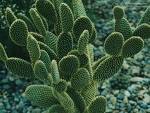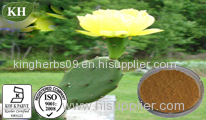
Pear cactus Extract
| Min. Order: | 1 Kilometer |
|---|---|
| Trade Term: | CIF |
| Payment Terms: | T/T, WU |
| Supply Ability: | 1000kg/week |
Company Profile
| Location: | China (Mainland) |
|---|---|
| Business Type: | Manufacturer |
Product Detail
| Means of Transport: | Air |
|---|---|
| Production Capacity: | 1000kg/week |
| Packing: | 25kg/drum or1kg/bag |
| Delivery Date: | ithin 5 days after payment |
Product Description
Pear cactus Extract
Active Ingredient: 100% Pear cactus Extract
Specification: 20:1
Test Method: TLC
Individuals who took a dietary supplement containing extracts of Opuntia ficus indica, a type of prickly pear cactus, before consuming alcohol, had reduced symptoms of alcohol hangover compared to individuals who drank but took placebo, according to an article in the June 28 issue of The Archives of Internal Medicine, one of the JAMA/Archives journals.
Alcohol hangovers cause substantial economic and health consequences, the article states. The severity of alcohol hangovers may be related to inflammation caused by impurities in alcoholic beverages and byproducts of alcohol metabolism. C-reactive protein, a protein produced by the liver, becomes elevated after injury or trauma and is thought to be involved in inflammation and alcohol hangovers. An extract from the skin of the prickly pear fruit, Opuntia ficus indica (OFI) has been shown to reduce inflammation, the article states.
Jeff Wiese, M.D., of Tulane University, New Orleans, and colleagues investigated the effect of OFI on the symptoms of alcohol hangover.
The researchers randomly assigned 55 young adult volunteers (aged 21 to 35 years) to receive either OFI or placebo five hours before alcohol consumption. The study participants were given dinner (cheeseburger, fries and soda) four hours before alcohol consumption started, and were able to choose a single type of alcohol to drink for the study: vodka, gin, rum, bourbon, scotch, or tequila.
Over four hours of drinking, volunteers consumed up to 1.75 grams of alcohol per kilogram of body weight, a quantity that has produced hangovers in previous studies. One hour after alcohol consumption ended, the researchers measured blood alcohol levels, and the volunteers were driven home.
The next morning, volunteers returned to the study site and had their vital signs measured, and blood and urine samples were taken. Hangover severity (based on nine symptoms) and overall well-being were assessed on a scale (zero to six points, with six points indicating the worst well-being). Two weeks later, the study was repeated with the same volunteers except those that were previously given OFI were given placebo and vice versa.
The researchers found that three of the nine symptoms of hangover - nausea, dry mouth, and loss of appetite - were significantly reduced after taking OFI. The average score for well-being the next morning was 2.75 for volunteers who took OFI and 3.10 for volunteers who took placebo. The researchers also found that levels of C-reactive protein were strongly associated with hangover severity, and C-reactive protein levels were 40 percent higher in volunteers who took placebo compared with OFI.





.jpg)

